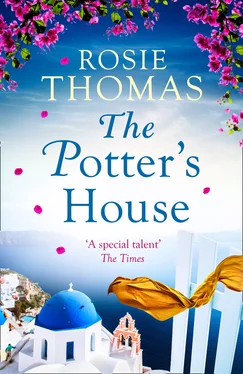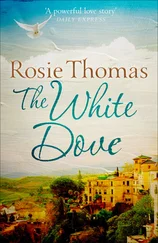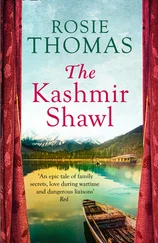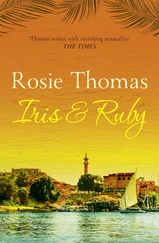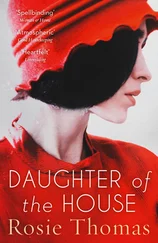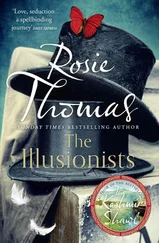‘Have you had enough to eat, Mother? Xan?’
‘Give him that last spoonful.’
Xan pushed over his plate.
‘There’s some fruit. We’ve got figs,’ Olivia suggested.
Meroula shook her head. ‘No fruit. Thank you.’
‘I will make some coffee when I’ve finished,’ Xan said with his mouth full.
‘Let me do it for you,’ Meroula responded.
Olivia let her. She was remembering what it had been like when she first came to Halemni. She had known Xan for only a few weeks, the time that it had taken for them to make their way slowly back to Europe and to know that they wanted to stay together. The last stage of the journey had been on a ferry out of Rhodes harbour. The hot, smoky bar and passenger lounge seemed to be full of weather-beaten men who knew Xan, and greeted him with full-on embraces and streams of questions. But after a brief talk with each of them during which he introduced Olivia as my girl , Xan preferred to stand the whole way, four hours of sailing, on the upper deck. Olivia leaned on the rail beside him, watching the curl of foam from the ship’s bows and the cliffs and rocky uplands of the other islands, her hand tucked under his arm and the thought in her mind that she was giving up everything she had known in her life so far to follow Xan Georgiadis back home.
The idea created a hollow and pleasurable sense of the irrevocable in the pit of her stomach. The travelling was over. Whatever this place waiting over the horizon turned out be like, it was where she would stay because it was where Xan belonged.
‘There it is.’
She followed the line of his pointing finger. A blue-grey smudge on the November horizon of the Aegean.
Forty minutes later the ferry made a complicated reverse manoeuvre in the bay of Halemni and brought the ship’s stern up against a stone jetty. Olivia stood beside Xan in the ship’s bowels as the massive steel door was lowered to reveal a widening rectangle of scenery. A rim of frosty blue sky. Rocky hillsides, brown and grey, and the whitewashed houses in a semicircle above the harbour. A narrow strip of shingle beach fringed with tamarisk trees and an expanse of pale-grey sea. It took a closer scrutiny for Olivia to notice the ruins of a castle on the highest rock cliff, and a more geometric composition of rock and stone clinging to the slopes beneath it. There were windows that looked like dark eyes.
‘The castle of Agrosikia, built by the Knights of St John, and Arhea Chorio, the old village,’ Xan said.
The steel door clanged into the horizontal against the jetty, and sailors and harbour men made the massive ropes fast. The little knot of people Xan and Olivia had been waiting with moved forward in a sudden surge and a couple of trucks nudged out of the hold.
‘There they are,’ Xan said. ‘My parents.’
Olivia saw them. A stout woman with a square body and a square face under a wedge of iron-grey hair, and a much smaller, thin and colourless man with a cigarette cupped in his fingers. With all her belongings in one pack on her back, she followed Xan off the ship and into her life on Halemni.
When Xan introduced Olivia, Meroula’s eyes travelled from her dusty boots to the top of her head. She was almost a foot shorter than Olivia, even when she drew herself up to her full height as she did now. The only son had come home at last, but instead of choosing to marry a Greek girl he had brought this outlandish creature with him. Nikos Georgiadis’s friendly handshake hardly compensated for the chilliness of Meroula’s greeting.
For the first weeks they lived with Meroula and Nikos, sleeping in the bedroom next to the parents’ and eating every meal with them. Olivia learned quickly, putting Greek words and then sentences together, and always deferring to Meroula in everything. To her initial surprise even this didn’t win Xan’s mother’s approval, but then she realised that nothing she did ever would win it because Meroula was her outright rival for Xan’s love and attention. Xan himself ducked out of the conflict.
He spent his days fishing with his boyhood friends or working, when the weather allowed it, on the new buildings for summer tourists that were inching their way upwards on the margins of Megalo Chorio. To keep out of Meroula’s way, Olivia spent her days exploring the island. In time she came to know every piece of it, from the sandy bays on the southern side to the wild rocks and remote inlets on the north and eastern flanks. It was ten miles from west to east and, at the narrowest point, a mile and a half from north to south. She walked and climbed, and sat on rocks and simply looked, and fell in love for the second time.
The weather changed with snapshot speed, from still clear days to wild storms followed by insistent rain, and then changed back again. The sea could take on every colour from almost black to pearl to turquoise, and the bare hillsides darkened with rain and then softened again under the afternoon sun.
Meroula said, ‘You will have to marry, Alexander. You cannot go on living in my house like man and wife without the blessing of the church.’
Xan laughed. ‘We will marry when we are ready, Mother. If you don’t want Olivia and me to live together here I’ll clear out and move in with Stefanos. Would you rather that?’
‘You cannot live anywhere on Halemni but with your own mother and father.’
‘Well, there is your answer.’ Xan winked at Olivia, Meroula gave her a black look.
Christmas came and went. January brought the first of the wild flowers in sheltered places. Olivia discovered clumps of tiny white wild cyclamen and blue anemones, and found the furry rosettes of mandrakes with their central boss of flowers like flattened eggs in a bird’s nest. She climbed between the wire-netting bushes and clumps of wild sage, up the steep goat path to the abandoned old village, and made herself at home in it. The stepping stones of the narrow streets were broken and tilted, with the spear-shaped leaves of arum and wild hyacinth pushing up between them.
The last few families had left in the Sixties, driven out by the lack of water and the hardness of life, retreating down to the coast to join the rest of their dwindling community. This was before the great money tide of tourism washed over the islands. The young men no longer wanted a back-breaking existence spent farming their family’s hillside terraces with donkeys and their bare hands, and the young women refused to marry into such a life. The little stone houses were roofless, door and window holes gaping, home to the goats and a few snakes and lizards.
Olivia wandered through the ruins with her camera.
Each house had its own atmosphere. In some the bare earth smelled sour and the loose stones rattled underfoot. In others the bread oven beside the ruined hearth still felt almost warm and she could imagine the smell of baking on the air. The twisted trunk of an old rose bush leaned at an angle against one door, blue paint daubs marked family ownership on another. But the Halemni families would never come back to Arhea Chorio. The only inhabitants were ghosts. Sometimes Olivia could feel people, walking up the street to the ruined church to answer the silent bell.
‘I can’t live with your mother any longer,’ Olivia said to Xan when spring had properly arrived and the hillsides were a picture of flowers.
‘You don’t have to.’
‘What do you mean?’
‘Vangelis is going to sell us his house. Bit by bit, as we raise the money. It’s more expensive than buying it outright, but beggars can’t be choosers. Let’s go and look at it.’
They walked up to the potter’s house. It was dirty and barely weatherproof, and full of the twisted remains of aborted pots, but Olivia and Xan knew immediately that they could make a home in it. They moved into one room, with plastic sheeting nailed across the window frame and fruit boxes for furniture. But the days were long and hot now, and they were happy to work all the hours that came.
Читать дальше
